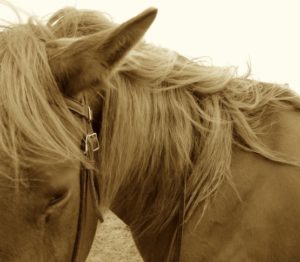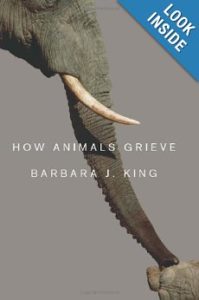 Barbara King is a member of a small group of articulate scientists discussing and contributing exciting research on non-human emotions.
Barbara King is a member of a small group of articulate scientists discussing and contributing exciting research on non-human emotions.
It’s a fascinating field and one that has, over the generations, weathered challenges of anthropomorphizing and, on the other end of the spectrum, outright dismissal.
- We know it’s silly to say: “My pony had a grudge on me and dumped me in the puddle.” That would be anthropomorphizing.
- But we’ve also seen horses act in ways unexplained by simple trained habits or muscle memory. And we certainly recognize they don’t like seeing another horse harmed. Even slaughter advocates would agree there.
Click here for article on compassion.
 Click here for article on intelligence.
Click here for article on intelligence.
King points out that not all species of animals grieve and even within a species, not all individuals grieve. Or, if they do, they may show it differently.
She writes:
I define grief as some visible response to death that goes beyond curiosity or exploration to include altered daily routines plus signs of emotional distress.
Horses who merely nudge or sniff at the body of a dead companion, for example, can’t be said to be grieving.
Horses who stand vigil in a hushed circle, for many hours, at the fresh grave of a lost friend may well be grieving.
A horse who refuses food and companionship, becomes listless and won’t follow normal routines for days when her friend dies?
Why wouldn’t we see this as grief?
Read more here.
Read an interview with King here.